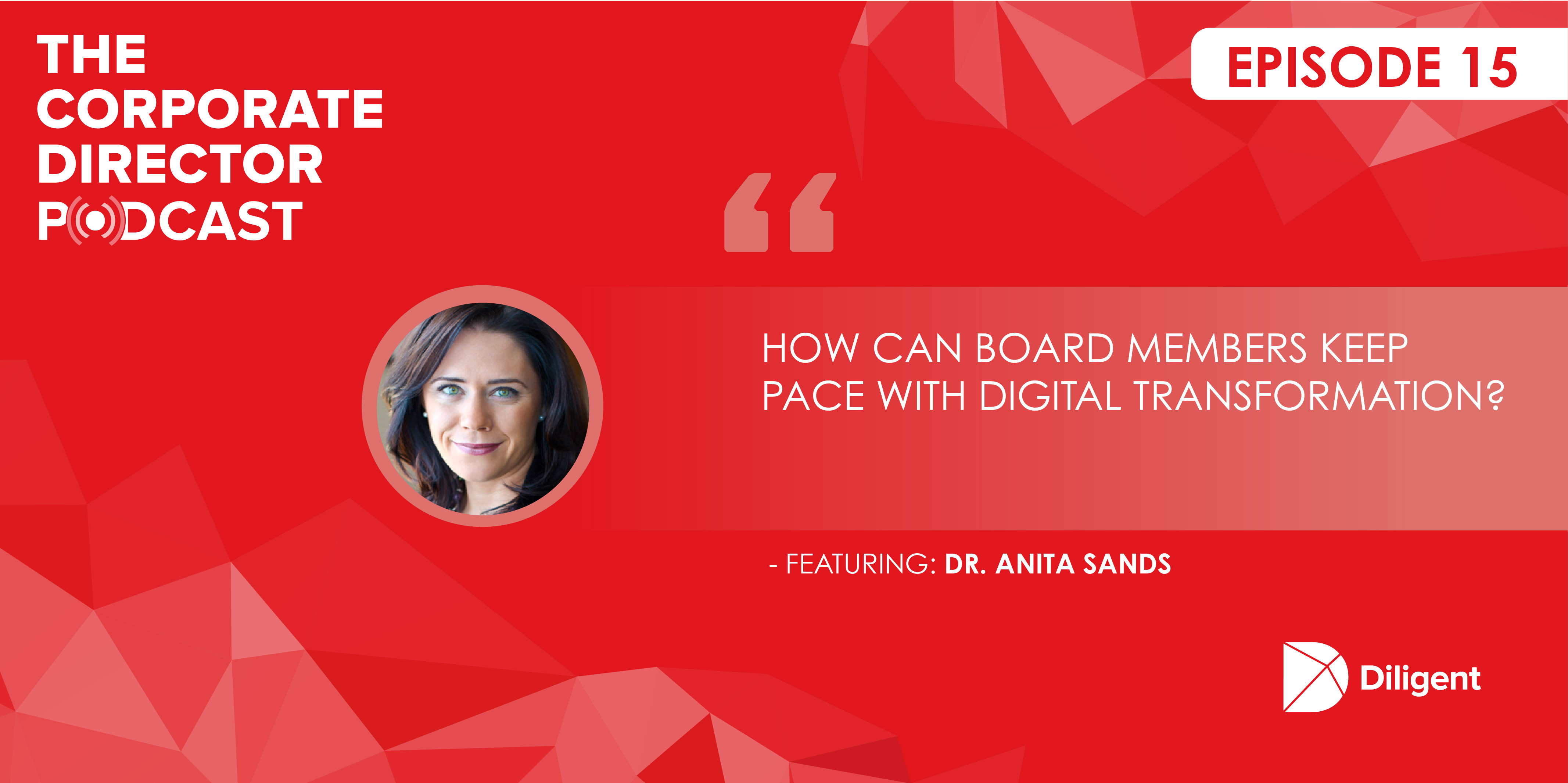GUEST: Dr. Anita Sands, board member for ServiceNow, Symantec, and Pure Storage and an advisory board member for Thrive Global and DocuSign
HOSTS: Dottie Schindlinger, VP of Thought Leadership, Diligent; and Meghan Day, Director of Directors’ Experience, Diligent
FEATURING: Brian Tayan, Researcher for The Rock Center for Corporate Governance at Stanford and Stanford Professor; and Annie Kors, Lead Researcher for Diligent Institute
IN THIS EPISODE:
- Today’s digital disruption requires “ambidextrous leadership.” Board must prioritize curiosity, humility, and a desire to learn in the CEO search, says Sands.
- Boards need to expand their recruiting channels. Sands refutes the idea that board diversity is a supply side problem.
- Maximizing diverse perspectives goes beyond “D&I.” Once new directors have been invited into the room, they need to be made to feel like they belong.
SUMMARY:
Digital transformation today isn’t like the technological changes of the past. Where B2B and B2C once predominated, now we have “O2O” (offline to online)—think Uber, Tinder, DoorDash and beyond. Ownership is giving way to access, especially for Millennials and Generation Z. And seemingly everything’s being offered as a service and paid for via subscription.
Amid these changes, a board’s challenges go beyond the technology. How can they obtain the “cognitive diversity,” constructive discourse, and leadership they need to adapt and thrive?
In this episode, Dr. Anita Sands shares insights from her perspective as a scientist, technologist, and board director with international experience.
1. Today’s digital disruption requires “ambidextrous leadership.”
“People can get hung up on the technology side of digital and all this change, but the technology piece isn’t actually the trickiest thing that’s happening.”
— Dr. Anita Sands, board member for ServiceNow, Symantec, and Pure Storage
A lot of this change feels new and revolutionary even though some of the concepts are quite old, Schindlinger observes, pointing out that the sharing economy is “about as old as it gets” in terms of a business model. How do boards get the right leadership in place to deal with these changes, for example, in a CEO search?
Boards must seek curiosity as well as skills, according to Sands. “Because the level of change is almost constant and because the degree is accelerating, you’re never going to find a CEO who knows all they need to know about the job.”
Boards should be looking for a CEO who has an innate level of curiosity and the humility to go out and learn and ask questions in the areas he/she doesn’t know, she explains. “A CEO who’s almost ambidextrous—someone that can manage two complimentary journeys at the same time.
2. Boards must expand their recruiting channels.
How do boards achieve a necessary range of perspectives among their own ranks?
Sands rebuts the notion that board diversity is a supply side problem. Rather, “We begin recruiting by asking around the table—who do you know who would be great on this board? Because we’re human, we tend to know people with backgrounds like our own. We tend to perpetuate the network effect of having boards that are predominantly white and predominantly male.”
The pipeline narrows when boards specify that a director should be a former or current CEO or CFO. Only 4.1% of the S&P CEOs are women, Sands points out.
Boards need to proactively take a fresh approach. She cited Trewstar, the firm that recruited her. The company specializes in sourcing female candidates and has placed over 100 women on boards, including two of the boards Sands serves on.
3. Maximizing diverse perspectives goes beyond “D&I.”
Once these diverse directors have been recruited, how do you make the most of the experiences and backgrounds they bring to the table?
“You want a board that’s very transparent and trusting of each other, one that can get into collegial but contentious or constructively critical conversations,” Sands says. “You don’t want people sitting around the table being guarded in what they say, or even worse so, holding back.”
To get to this place, she says, boards need to move beyond diversity and inclusion and talk about belonging.
“Diversity is a fact, inclusion is a choice, and belonging is a feeling,” she explains. “There’s a big difference in being included on a board and feeling like you belong—particularly if you’re there as the first female or first ethnic minority appointee. You may be included in the room, but that does not necessarily mean that the predominant culture around the table is going to make you feel as though you belong.”
Sands and Schindlinger discuss ways boards can foster such a sense of belonging, such as a formal new director onboarding process, assigning “board buddies” to provide support and sounding boards, and being aware of unconscious bias and how it can creep into casual conversations.
“There’s no point into going to such great lengths to recruit diverse candidates and bring them onto your board if they’re not going to feel like they belong, and they don’t feel psychologically safe. Because if they don’t feel psychologically safe, what happens? They simply won’t speak up.”
— Dr. Anita Sands, board member for ServiceNow, Symantec, and Pure Storage
Also in this episode, the group poses a future-focused question: Can AI and machine learning make directors’ jobs easier? Sands shares her humorous encounters with the U.S. sports world, and Day impersonates famed and fallen biotech entrepreneur Elizabeth Holmes, in honor of the October 31 recording date.
Later in this episode… Annie Kors interviews Brian Tayan about the recently released joint report from Diligent Institute and The Rock Center, “Stakeholders Take Center Stage: Director Views on Priorities and Society.”


